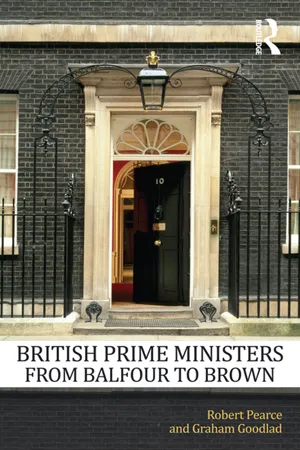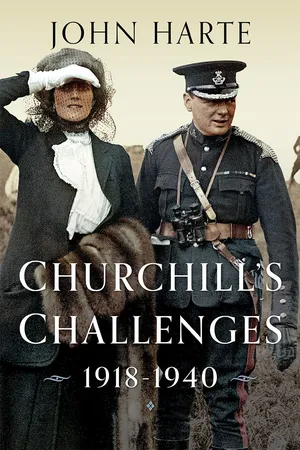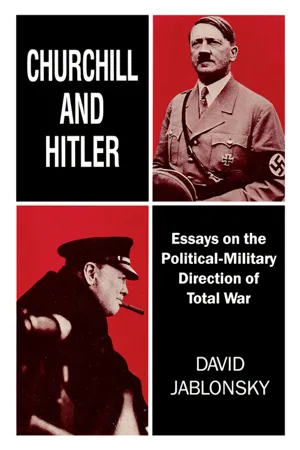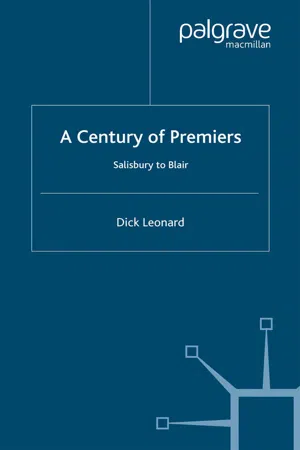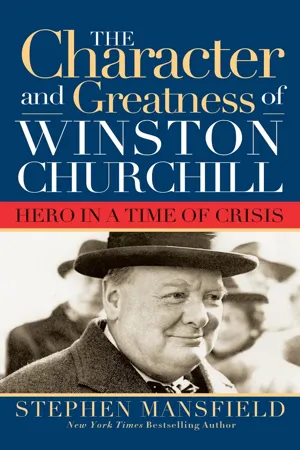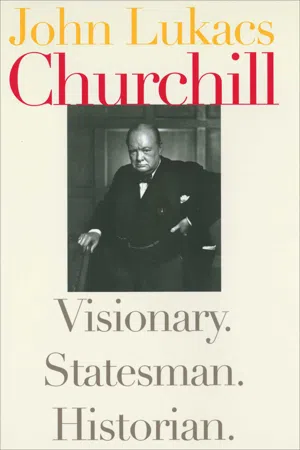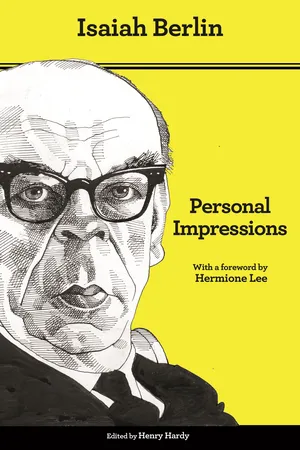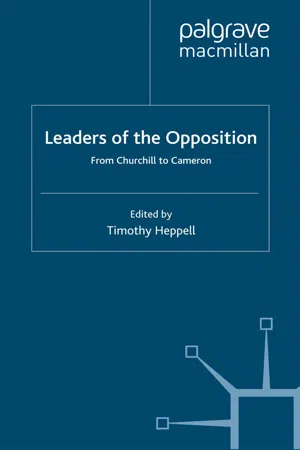History
Winston Churchill
Winston Churchill was a prominent British statesman who served as Prime Minister during World War II, leading the country to victory against Nazi Germany. Known for his powerful oratory and unwavering determination, Churchill's leadership and resilience inspired the British people and earned him a revered place in history. His contributions to the Allied war effort and his role in shaping post-war Europe remain influential to this day.
Written by Perlego with AI-assistance
Related key terms
1 of 5
9 Key excerpts on "Winston Churchill"
- eBook - ePub
- Robert Pearce, Graham Goodlad(Authors)
- 2013(Publication Date)
- Routledge(Publisher)
9 Winston Churchill (1874–1965) Prime Minister: May 1940–July 1945, October 1951–April 1955‘I have seen him take a lot of punishment, and not once did he look like a loser. Not once did he give me the feeling that he was in any way worried or anxious as to the outcome of the fight. Gradually I have come to think of him as invincible.’Diary of Churchill’s doctor, Lord Moran, 20 August 1943.1In 2002 Winston Churchill was voted the ‘greatest Briton’ in a BBC poll. He is certainly the most celebrated: more books have been written about him than about any other person in British history. He is highly regarded for many aspects of his career, including his ‘wit and wisdom’: surely everyone knows at least one of his, often politically incorrect, jokes. But it is for his wartime leadership, from 1940 to 1945, that he is especially remembered. A.J.P. Taylor, an iconoclastic left-wing historian who delighted in mocking the political establishment in general and pretentious premiers in particular, nevertheless described Churchill – albeit hidden away in a footnote – as ‘the saviour of his country’.2 Yet in fact there is no consensus view. Churchill is a highly controversial figure. The spectrum of verdicts stretches, at the one end, from the glowing, almost filial endorsement of the official multi-volume biographer Martin Gilbert, to, at the other, the intense, unremitting criticisms voiced by Clive Ponting and John Charmley, the latter significantly entitling his 700-page study Churchill: The End of Glory.The rise to the premiershipWinston Churchill felt enormous exhilaration on becoming Prime Minister on 10 May 1940. At last he had the authority he craved. ‘I felt as if I were talking with destiny, and that all my past life had been but a preparation for this hour and for this trial.’3 - eBook - PDF
- John Harte(Author)
- 2024(Publication Date)
- Pen and Sword Military(Publisher)
We cannot imagine the culture CHURCHILL’S CHALLENGES, 1918–1940 xii shock when very different people confronted each other for the first time. Even romantic novelist Thomas Hardy, who chose to write about rural life in the nineteenth century, could not conceive that moment, or he would have described the confrontation in one of his novels. Industrialisation changed everything. If the country people felt less sure of themselves after contact with city folk arriving as tourists to patronise them, the Victorians in their stovepipe hats, with their ladies in crinolines, were convinced they were the masters and mistresses, not only of their own personal realms of influence, but of the known world. Winston inherited that supreme self-confidence of the Victorian age, with the audacity of its explorers and pioneers of flight and speed, and the study of the human mind. All conceived and brought about the modern age. Winston Churchill is generally known today as a dedicated and visionary statesman, orator, Member of Parliament, Prime Minister, fine author and, in particular, the leader of the victorious Allies who defeated the biggest, best-trained and equipped, and most efficient armies in the Second World War. Since his earliest desire was to lead Great Britain and protect the British Isles, that audacious motivation seems to have been passed on to him as a historic prerogative of the previous leading families. Most nations are desperate for dynamic leaders today, and here was a man who knew from the earliest age that he was destined to lead the nation he loved and of which he was proud. If we respect successful and charismatic leaders and want to know how they are shaped, we need answers to those critical questions about how young Winston leapt from being a junior army officer at the age of twenty to a successful journalist and a Member of Parliament with several important ministerial portfolios. - eBook - ePub
Churchill and Hitler
Essays on the Political-Military Direction of Total War
- David Jablonsky(Author)
- 2014(Publication Date)
- Routledge(Publisher)
4 Churchill: The Victorian Man of ActionThe most common public image of Winston Churchill is the wartime picture taken by the famed photographer, Yousuf Karsh. The British leader glowers out from that photograph, truculent and combative. Never mind that the menacing look was reportedly caused by Karsh’s insistence that Churchill remove his ever-present cigar from his mouth. What remains is that quintessential aura of resistance and defiance against all odds that came to symbolize the spirit of the nation Churchill led throughout the Second World War. Paradoxically, this image of a modern warlord in the greatest of all twentieth century conflicts owes its existence to the late Victorian era into which Churchill was born in 1874. For it was during those years in the Indian summer of Queen Victoria’s reign that the future British Prime Minister developed his singular traits of character and formed his concepts of war and personal leadership that were to endure throughout his long life.Foremost among the Victorian influences on the young Churchill was a pervasive sense of historical continuity that stretched beyond the Victorian years. To begin with, there was Blenheim Palace with its obelisks of victory, its grand vistas that created a sense of drama, and the great achievements ubiquitously carved in stone, woven in tapestries and painted on canvas. A monument, in short, to one man, John Churchill, first Duke of Marlborough, whose exploits fed into the unique Whig legend devised by the British in the intervening centuries to underpin their imperial ambitions. It was in that great mansion that Churchill was born, and it was among the patrician descendants of the great Whig aristocracy from Stuart and Georgian England that he spent his formative years. It was thus no accident that he never deviated throughout his life from what the British historian J.H. Plumb has described as “that curious ideology of the Whigs, half truth, half fiction; half noble, half base.”1 - eBook - PDF
A Century of Premiers
Salisbury to Blair
- D. Leonard(Author)
- 2015(Publication Date)
- Palgrave Macmillan(Publisher)
The first was evidenced by the way he galvanised his ministers, the armed forces and the Civil Service by his constant insistence on the urgency of the task. Every day a mass of memoranda flowed from Churchill’s hand, many of them headed by the imperious instruction: ‘ACTION THIS DAY’. As for his speeches, overblown and Baroque as they now often seem, and already sounding rather old-fashioned at the time, they struck a curious resonance with people of all classes. Their immedi- ate impact in the House of Commons was amplified many times when they were repeated in BBC broadcasts. On his 80th birthday, Churchill modestly disclaimed the suggestion that he had inspired the nation in 1940, saying: ‘It was the nation and the races dwelling all around the globe that had the lion heart. I had the luck to be called upon to give the roar.’ That was to understate his role, and he knew it. Without Churchill, it must be doubted whether the British would have summoned up the determination to resist after the disasters of May and June. Winston Churchill 171 A serious argument could be made that Churchill’s unique contribution was completed by the end of 1940, and that if he had then died or been replaced by a more run-of-the-mill leader, it would have made no more than a marginal difference to the outcome of the war. For it was not won by Churchill’s leadership, nor primarily by feats of British arms, but by Hitler’s megalomania and grievous errors of judgement which brought both Russia and America into the war against him, ultimately ensuring his defeat. Essential or not, Churchill continued to play a prominent role, not quite until the end of the war, but up to and beyond the final defeat of Germany in May 1945. For him, it was an all-absorbing task, to which he untiringly devoted himself – as if in a trance – at any hour of the day or night, to the continual exasperation of his hard-pressed staff. - eBook - ePub
Character and Greatness of Winston Churchill
Hero in a Time of Crisis
- Stephen Mansfield(Author)
- 2004(Publication Date)
- Cumberland House Publishing(Publisher)
HERE IS a tendency among people in positions of responsibility to lose sight of the emotions and experiences that give meaning to the very idea of leadership. Long experience with the tough issues of life leaves its mark, and it is easy to give in to a hardened view of the world. When this happens, though, the leader diminishes himself. He may be skillful and competent, but he has lost the ability to inspire and create. The difficult challenge is to endure the jarring battles of life without letting go of the feeling and innocent wonder that make those battles worthwhile.Winston Churchill was saved from many of the pitfalls of leadership because he was an absolutely unapologetic romantic. Except for his periods of depression, he seemed to ever have in view a cheery, ideal world of romance and beauty. He was a fiery realist, but he also believed that imagination, tenderness, and laughter have their place. “We want a lot of engineers in the world,” he said, “but we do not want a world of engineers.”142Anything but an engineer, Churchill was a romantic of the most emotional and tearful kind. “I’ve always been blubbery,” he confessed. William Manchester suggested that his “tears flowed at the mention of gallantry in battle, the thought of ‘invincible knights in olden days,’ victims of anti-Semitism, Canadian loyalty to the Empire, the death of George VI, Elizabeth II’s kindness toward him, or the name of Franklin Roosevelt—‘the best friend Britain ever had.’”143 Observers who stood close enough saw that he wept through many of his speeches, during visits to bomb damage in London, and when lists of battle casualties crossed his desk. But he wept over much more mundane things as well. He loved to watch movies, and during a showing of Never Take No for an Answer, a movie about a little boy and a dying donkey, Churchill became undone. “Oh, the donkey’s dead!” he sobbed. “No, no, Prime Minister, she’s alive,” consoled his staff members. “If the donkey dies, I shan’t stay. I shall go out,” Churchill tearfully insisted.144 - eBook - PDF
Politicians and Rhetoric
The Persuasive Power of Metaphor
- J. Charteris-Black(Author)
- 2016(Publication Date)
- Palgrave Macmillan(Publisher)
32 2 Churchill: Metaphor and Heroic Myth 2.1 Background Churchill was the pastmaster of twentieth-century political oratory and has set the standards that subsequent politicians have often sought to emulate. Soon after his election George W. Bush let it be known that he had placed a bust of Churchill in the White House Oval Office. His post-September 11th speeches adopted Churchill’s rhetorical style and in early 2004 Bush claimed in a speech that Churchill was not just ‘the rallying voice of the Second World War’ but also ‘a prophet of the Cold War’. 1 It is significant that the politician who attached great personal importance to oratory in the classical sense was also the one who had the greatest opportunity to employ it for that most vital of political objectives: national survival. Churchill has been able to set the benchmark for political speaking in the modern period precisely because he fundamentally believed in the power of the spoken word to win over hearts and minds; as he said in 1954 ‘To jaw-jaw is better than to war-war’. Churchill’s belief in the power of the spoken word reflects in the fact that he is thought to have memorised by heart the complete pre- prepared scripts for his speeches. He published the first volume of his speeches before he was thirty and eventually went on to publish eighteen volumes. In 1897 he published an essay ‘The Scaffolding of Rhetoric’ arguing for the importance of oratory and yet it was not until forty-three years later that his mastery of the gentle art of persuasion was the main reason for his appointment as Prime Minister. Although his radio broadcasts provided leadership during a time of national crisis, his greatest political performances were in the House of Commons. For 1 Speech opening Churchill exhibition at the Library of Congress. J. Charteris-Black, Politicians and Rhetoric © Jonathan Charteris-Black 2005 - No longer available |Learn more
Churchill
Visionary. Statesman. Historian.
- John Lukacs(Author)
- 2020(Publication Date)
- Yale University Press(Publisher)
* These are proper tributes to Churchill the maker of history, to a statesman whose mind was steeped in history. Yet I think that another tribute may still be due: to Churchill the historical writer. There exist bad histories that are written tellingly or even well; but there can be no good history that is not told or written well. After all, whatever the research, there is no historical fact the meaning of which exists separately from its statement, from its very phrasing.Churchill formed his own style. He was influenced by Gibbon and Macaulay but he did not emulate them. Stunning passages and phrases are abundant in every one of his books. I reproduce but a few of them, collected and jotted down on various scraps of paper in a near-lifetime of reading. In Lord Randolph Churchill about the Whigs: “The debate was heralded for several days by much parliamentary snarling.” About some of the Tories: “the prosaic authoritarians who chafe the hearts of Celtic peoples.” In Marlborough about Charles II: “Manouevre, fence, and palter as he might, he always submitted, and always meant to submit, with expedition to the deep growl of his subjects and to the authority of their inexpugnable institutions.” About James II in 1686: “Nay, he would not reject even the dim, stubborn masses who had swarmed to Monmouth’s standards in the West, or had awaited him elsewhere, whose faith was the very antithesis of his own, and whose fathers had cut off his father’s head.” In The World Crisis about 1914: Germany “clanked obstinately, recklessly, awkwardly towards the crater and dragged us all with her.” And of 28 July 1914, the First Fleet leaving Portsmouth for Scapa Flow, through the English Channel: “scores of gigantic castles of steel wending their way across the misty, shining sea, like giants bowed in anxious thought.” An immortal passage! Or about the German admiral, von Spee, cut off from refueling or repairing his ships: “He was a cut flower in a vase, fair to see, yet bound to die and die very soon if the water was not renewed.” About a general who ordered the evacuation from Gallipoli: “He came, he saw, he capitulated.” In The Aftermath about Russia after the Bolshevik revolution: “Russia has been frozen in an indefinite winter of sub-human doctrine and superhuman tyranny.” In A History of the English-Speaking Peoples - eBook - ePub
Personal Impressions
Updated Edition
- Isaiah Berlin, Henry Hardy(Authors)
- 2014(Publication Date)
- Princeton University Press(Publisher)
The period between the wars marks a decline in the development of human culture if it is compared with that sustained and fruitful period which makes the nineteenth century seem a unique human achievement, so powerful that it persisted, even during the war which broke it, to a degree which seems astonishing to us now. The quality of literature, for example, which is surely one of the most reliable criteria of intellectual and moral vitality, was incomparably higher during the war of 1914–18 than it has been after 1939. In Western Europe alone these four years of slaughter and destruction were also years in which works of genius and talent continued to be produced by such established writers as Shaw and Wells and Kipling, Hauptmann and Gide, Chesterton and Arnold Bennett, Beerbohm and Yeats, as well as such younger writers as Proust and Joyce, Virginia Woolf and E. M. Forster, T. S. Eliot and Alexander Blok, Rilke, Stefan George and Valéry. Nor did natural science, philosophy and history cease to develop fruitfully. What has the more recent war to offer by comparison?Yet perhaps there is one respect in which the Second World War did outshine its predecessor: the leaders of the nations involved in it were, with the significant exception of France, men of greater stature, psychologically more interesting, than their prototypes. It would hardly be disputed that Stalin is a more fascinating figure than Tsar Nicholas II; Hitler more arresting than the Kaiser; Mussolini than Victor Emmanuel; and, memorable as they were, President Wilson and Lloyd George yield in the attribute of sheer historical magnitude to Franklin Roosevelt and Winston Churchill.History, we are told by Aristotle, is ‘what Alcibiades did and suffered’.1 This notion, despite all the efforts of the social sciences to overthrow it, remains a good deal more valid than rival hypotheses, provided that history is defined as that which historians actually do. At any rate Churchill accepts it wholeheartedly, and takes full advantage of his opportunities. And because his narrative deals largely in personalities and gives individual genius its full and sometimes more than its full due, the appearance of the great wartime protagonists in his pages gives his narrative some of the quality of an epic, whose heroes and villains acquire their stature not merely – or indeed at all – from the importance of the events in which they are involved, but from their own intrinsic human size upon the stage of human history; their characteristics, involved as they are in perpetual juxtaposition and occasional collision with one another, set each other off in vast relief.Comparisons and contrasts are bound to arise in the mind of the reader which sometimes take him beyond Churchill’s pages. Thus Roosevelt stands out principally by his astonishing appetite for life and by his apparently complete freedom from fear of the future; as a man who welcomed the future eagerly as such, and conveyed the feeling that whatever the times might bring, all would be grist to his mill, nothing would be too formidable or crushing to be subdued and used and moulded into the pattern of the new and unpredictable forms of life into the building of which he, Roosevelt, and his allies and devoted subordinates would throw themselves with unheard-of energy and gusto. This avid anticipation of the future, the lack of nervous fear that the wave might prove too big or violent to navigate, contrasts most sharply with the uneasy longing to insulate themselves so clear in Stalin or Chamberlain. Hitler, too, in a sense, showed no fear, but his assurance sprang from a lunatic’s violent and cunning vision, which distorted the facts too easily in his favour. - eBook - PDF
Leaders of the Opposition
From Churchill to Cameron
- T. Heppell(Author)
- 2012(Publication Date)
- Palgrave Macmillan(Publisher)
But only four Premiers serving entirely in the twentieth century managed to hang on to the party leadership after losing a General Election and going into Opposition, before then coming back for another term in Downing Street, with only two of these cases since the Second World War: Churchill and Harold Wilson (Theakston, 2010: 3). And Churchill differed from Wilson in that the scale of his defeat in 1945 compared to 1970 was greater and the way back was longer, taking two General Elections and six years. Churchill was different in another way too in that he was almost a part- time Leader of the Opposition for much of this period. He had ‘plenty of 8 Winston Churchill other things to do’ (Macmillan, 1969: 40): working with a team of assistants and researchers on his multi-volume and immensely lucrative war memoirs; painting pictures; undertaking a great deal of foreign travel. Despite his election defeat and being out of office, ‘as a world statesmen he grew in stature after the war’ (Addison, 1992: 386). He came to seem a figure almost ‘above and beyond British politics’ (Ramsden, 1977: 415). His memoirs and his headline-grabbing and agenda-setting speeches and interventions in the USA and in European politics helped to boost his world reputation, feed a personality cult and put him in different (and higher) league than other British politicians in a way unique for a Leader of the Opposition (Ramsden, 1995a: 180). Public communication Churchill is remembered for his famous speeches on the international stage during these Opposition years – at Fulton, Zurich and Strasbourg. Other Conservative politicians were often unhappy about his pronouncements about the ‘Iron Curtain’, the threat from Soviet expansionism and the need for European unity when he made these speeches, but as events moved on his warnings about Stalin could be seen as prescient and fitted into a narra- tive about his role in the 1930s (Ramsden, 1995b: 109–10).
Index pages curate the most relevant extracts from our library of academic textbooks. They’ve been created using an in-house natural language model (NLM), each adding context and meaning to key research topics.
